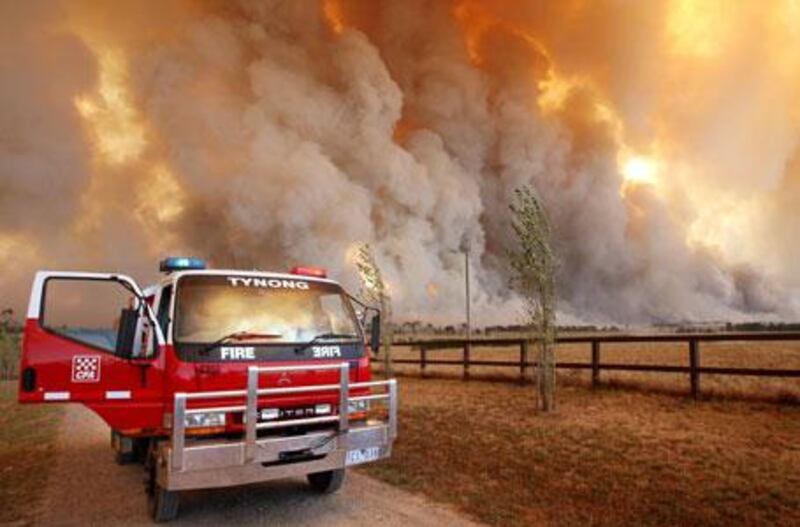Australia weathered the storm of the global economic slowdown better than any other developed nation. But a different squall, that over the country's action on climate change, may have more severe economic consequences. Clifford Coonan, foreign correspondent, reports In Byron Bay, one of the most beautiful holiday spots in Australia, the climate change debate is becoming a bitter battle of ideologies and scientific theories that could have huge economic ramifications.
Australia, the only developed economy to avoid the recession, is reaping the benefits of its economic resilience. The country's budget deficit is expected to be a quarter lower than previously forecast, due to an economic recovery that has delivered higher tax revenues and lower welfare spending than expected. But the questions are all about why the Labor government of Kevin Rudd, the prime minister, is not delivering a surplus in this time of plenty.
The conflict in Byron Bay began last year when the local government adopted a coastal development policy of "planned retreat" in the face of rising sea levels. The Byron Shire council, which is run by the Greens, introduced a planning policy that would effectively prevent residents from building rock walls to protect their beachfront homes from rising seas. Locals, who include some of Australia's richest and most famous musicians, actors and politicians, took action and sued the council.
"We want a council that's focused on the three Rs - rates, roads and rubbish - rather than waste money in legal proceedings and getting together a coastal management plan that the state government has already said it won't accept," Ed Ahern, the head of the Byron United business group, told The Australian newspaper. Here, in microcosm, you have a debate being played out all over this country of 21 million, who voted Kevin Rudd in as prime minister in 2007 with a resounding majority. He is expected to call an election for September or October.
Mr Rudd is well ahead in opinion polls and has the option of calling an early poll over his climate change policy. But with the economy performing well, talk of an early poll has declined. Mr Ahern's combative tone, however, echoes a rising swell of conservative opinion in Australia that is now less prepared to argue the pitch and toss of climate change. This month, the land and environment court of New South Wales ordered the council to abandon the plan and instead to fight rising waters at Belongil Beach, just north of Byron Bay, by using seawalls, dune protection and stabilising the beach.
The decision could involve legal costs of more than A$2 million (Dh6.6m), which has angered many in the local community. More significantly, it could become a template for councils all over Australia, requiring them to repair and stabilise beachfront areas threatened by erosion. Politically, Mr Rudd's policies, which aim to cut carbon output by 5 per cent by 2020 through cap and trade, may prove more challenging than expected as the scientific arguments about climate change have been undermined.
The first disaster for Mr Rudd's adherence to the perceived wisdom on climate change was leaked e-mails that critics claimed to show scientists from the British University of East Anglia's world-leading climatic research unit manipulating data to silence sceptics. Then there was the discovery of incorrect figures in the UN Intergovernmental Panel on Climate Change's research into the disappearance of Himalayan glaciers.
While the overall research has not been questioned, the way it is compiled has been, and none of this helps the lobby trying to stop climate change, including Mr Rudd's government. Tony Abbott, the Australian leader of the opposition, is proposing a fund to pay companies that cut emissions and meet certain criteria such as maintaining jobs. It would provide grants for solar panels and upgrade power stations, and Mr Abbott reckons his plan will cost A$4 billion, a fraction of what Mr Rudd's administration is to spend.
The Liberal Party opposition is also addressing the issue in the clear language voters like, without jargon about carbon credits and complex property rights. "Our policy will be simpler, cheaper and more effective than the government's," Mr Abbott says. "We will go to the market and say 'give us your lowest cost environmental improvements and reductions in emissions'." The credibility of the environmentalist lobby in Canberra has also been harmed by a A$3.7bn programme to introduce home insulation using metal foil that has led to the electrocution deaths of four people so far. The scheme has left Peter Garrett, the environment minister and former celebrity campaigner, under strong pressure to resign.
Meanwhile, the advocacy group Beyond Zero Emissions, which foresees an emission-free Australia by 2020, has outlined a plan that would move Australia to 100 per cent renewable energy within a decade for an annual investment of A$40bn, or 3.5 per cent of annual GDP, on solar-thermal power plants and wind technology. The campaign has been backed by the Australian Greens, the local government of the city of Melbourne and David de Kretser, the governor of Victoria.
The whole debate seems bizarre when you watch car drivers in 49 American states digging out their vehicles in freezing conditions, while you apply sun cream in what has been the hottest three-month period on record for the part of the atmosphere closest to the earth, the lower troposphere. Last year was the second-hottest year in Australia since records began. And while scientists are casting doubt on some of the research blaming carbon emissions for the rising water levels and worsening climactic conditions, 90 per cent of them remain convinced that global warming due to human greenhouse gas emissions remains a threat to our planet, especially the beautiful beachfront homes of Byron Bay.
business@thenational.ae





